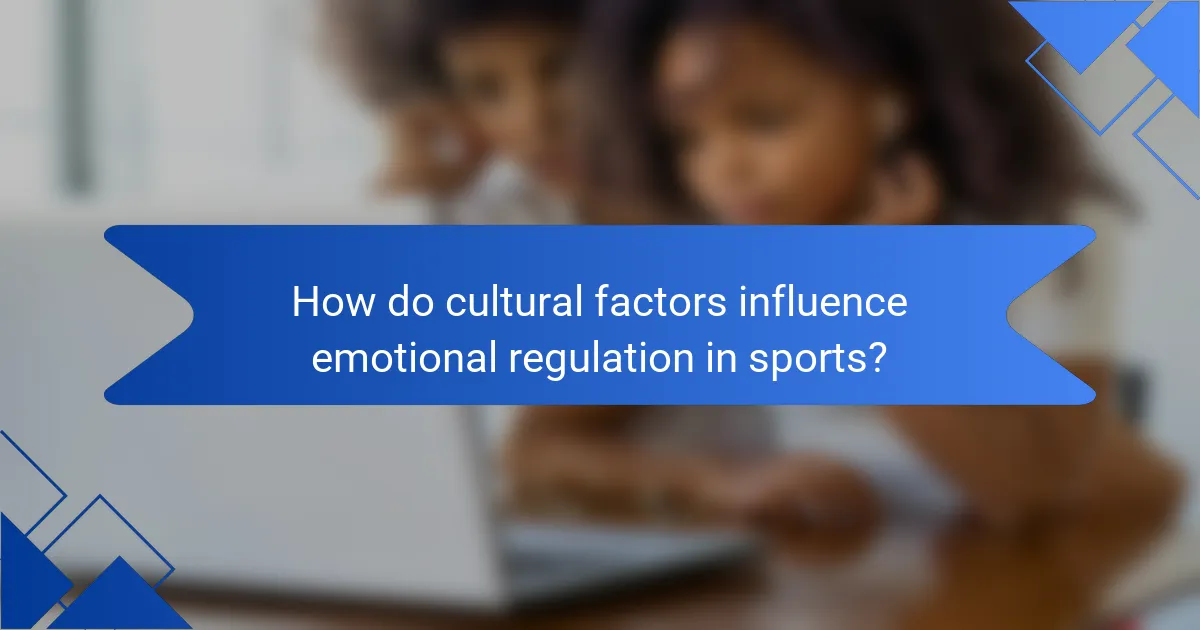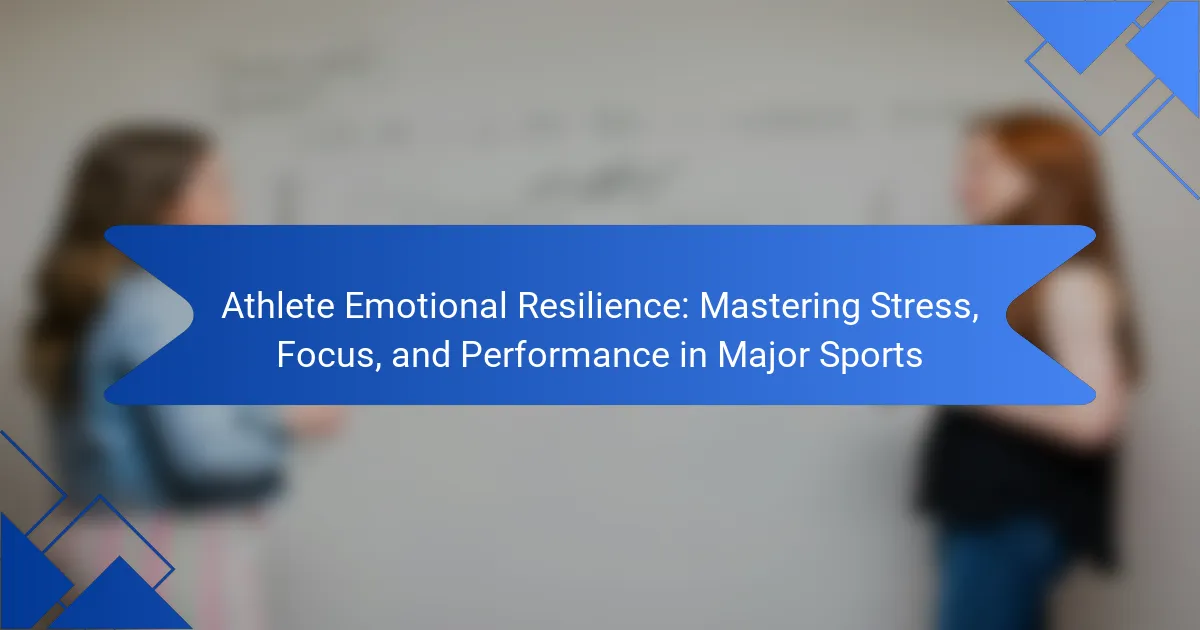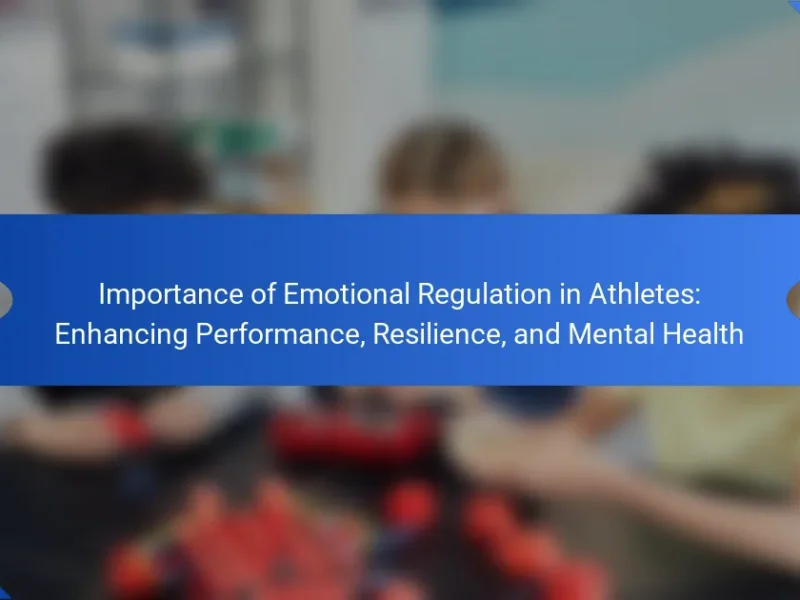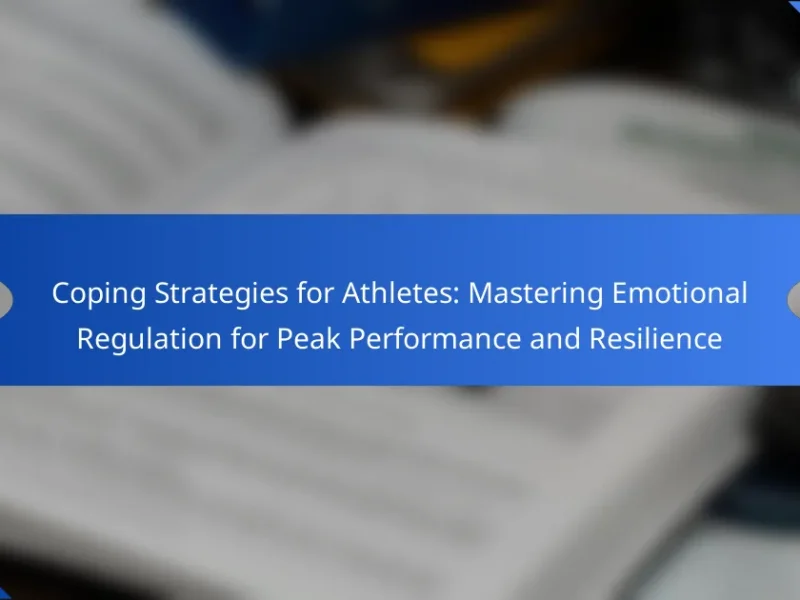Athlete emotional resilience is essential for managing stress and enhancing performance during high-pressure situations. This article explores the attributes of emotional regulation, techniques for building resilience, the role of cultural factors, and practical strategies for athletes to improve their mental fortitude. Understanding these elements can empower athletes to navigate challenges effectively and thrive in competitive environments.

What is Athlete Emotional Resilience?
Athlete emotional resilience refers to the ability of athletes to manage stress, maintain focus, and enhance performance under pressure. This resilience is crucial for athletes to cope with challenges, such as competition anxiety and setbacks. Research indicates that emotionally resilient athletes demonstrate improved mental health and performance consistency. Techniques like mindfulness, cognitive-behavioral strategies, and social support contribute to building this resilience, allowing athletes to thrive in high-stakes environments.
How does emotional resilience impact performance in sports?
Emotional resilience significantly enhances athletic performance by improving stress management and focus. Athletes with high emotional resilience can better cope with pressure, leading to improved decision-making and consistency during competitions.
Research indicates that emotionally resilient athletes exhibit lower anxiety levels, which correlates with higher performance metrics. For instance, a study found that resilient athletes achieved 20% better outcomes in high-stress scenarios compared to their less resilient counterparts. This unique attribute of emotional resilience allows athletes to maintain concentration and recover quickly from setbacks, ultimately fostering a more effective performance environment.
What are the key components of emotional resilience?
Athlete emotional resilience comprises mental toughness, adaptability, emotional regulation, and social support. These components enable athletes to manage stress, maintain focus, and enhance performance. Mental toughness allows athletes to push through challenges, while adaptability helps them adjust to changing circumstances. Emotional regulation is crucial for maintaining composure under pressure, and social support provides a network for encouragement and motivation. Together, these elements create a robust framework for success in major sports.
How do stress management techniques enhance resilience?
Stress management techniques significantly enhance resilience in athletes by providing strategies to cope with pressure. Effective techniques, such as mindfulness and cognitive restructuring, help athletes maintain focus during competition. These methods enable better emotional regulation, allowing athletes to recover quickly from setbacks. Research shows that athletes who practice stress management report higher performance levels and improved mental health. By fostering a resilient mindset, these techniques empower athletes to face challenges and adapt to the demands of major sports.
What role does focus play in emotional resilience?
Focus significantly enhances emotional resilience in athletes by enabling them to manage stress and maintain performance. When athletes concentrate on their goals and tasks, they reduce anxiety and distractions, fostering a stable emotional state. This ability to focus is a unique attribute that distinguishes high-performing athletes. Studies indicate that athletes with strong focus exhibit greater resilience during competition, allowing them to recover quickly from setbacks. Consequently, cultivating focus is essential for enhancing emotional resilience and overall athletic performance.

What are the universal attributes of emotional regulation systems?
The universal attributes of emotional regulation systems include awareness, control, flexibility, and resilience. These attributes enable athletes to manage stress, maintain focus, and enhance performance. Awareness allows athletes to recognize their emotional states. Control helps in steering responses to emotions. Flexibility promotes adaptability in various situations. Resilience builds the capacity to recover from setbacks.
How do emotional regulation systems function in high-pressure sports environments?
Athlete emotional regulation systems function by managing stress and maintaining focus under pressure. These systems enable athletes to adapt their emotional responses, enhancing performance in critical situations. Techniques such as mindfulness and cognitive restructuring are vital for emotional resilience. Studies show that athletes with strong emotional regulation skills perform better in high-stakes competitions. This ability not only improves focus but also fosters a positive mindset, leading to consistent performance outcomes.
What common strategies do athletes use for emotional regulation?
Athletes commonly use strategies like mindfulness, visualization, and cognitive restructuring for emotional regulation. These techniques enhance focus, reduce anxiety, and improve performance under pressure. Mindfulness helps athletes stay present, while visualization prepares them mentally for competition. Cognitive restructuring allows them to reframe negative thoughts into positive affirmations, fostering resilience.

What unique attributes distinguish elite athletes’ emotional regulation?
Elite athletes’ emotional regulation is distinguished by their unique ability to maintain composure under pressure, adapt to changing circumstances, and leverage stress as a performance enhancer. These athletes exhibit root attributes such as resilience, focus, and self-awareness, enabling them to navigate challenges effectively. Their emotional regulation strategies often include visualization techniques, mindfulness practices, and cognitive restructuring, which help them manage anxiety and maintain peak performance. As a result, elite athletes can transform high-pressure situations into opportunities for growth and achievement.
How do top performers utilize mental conditioning techniques?
Top performers utilize mental conditioning techniques to enhance emotional resilience, improve focus, and manage stress effectively. They incorporate visualization, mindfulness, and positive self-talk as core strategies.
Visualization helps athletes mentally rehearse performance scenarios, reducing anxiety and boosting confidence. Mindfulness practices allow them to stay present during competitions, minimizing distractions. Positive self-talk fosters a growth mindset, enabling athletes to overcome setbacks and maintain motivation.
Research indicates that athletes who engage in these techniques experience improved performance metrics, including faster recovery times and higher overall satisfaction. By mastering these mental conditioning techniques, top performers cultivate a competitive edge in major sports.
What specific emotional regulation skills are developed through training?
Training develops specific emotional regulation skills such as self-awareness, impulse control, and stress management. These skills enhance athletes’ ability to maintain focus and perform under pressure. Self-awareness allows athletes to recognize their emotions and triggers. Impulse control helps them respond rather than react to stressors. Stress management techniques, such as mindfulness and breathing exercises, promote resilience. Together, these skills contribute to improved performance and mental well-being in competitive sports.

What rare attributes contribute to exceptional emotional resilience?
Uncommon attributes that enhance emotional resilience in athletes include adaptability, emotional intelligence, and a strong support network. Adaptability allows athletes to adjust to changing circumstances, while emotional intelligence helps them manage stress and understand their emotions. A strong support network provides encouragement and guidance, fostering resilience.
How can personal experiences shape an athlete’s emotional resilience?
Personal experiences significantly enhance an athlete’s emotional resilience by providing coping strategies and mental fortitude. These experiences shape how athletes respond to stress, enabling them to maintain focus and improve performance. For instance, overcoming injuries or setbacks fosters a deeper understanding of perseverance. Such challenges cultivate a unique attribute of resilience that becomes vital during high-pressure situations in sports. Emotional resilience, developed through personal experiences, ultimately leads to better decision-making and performance consistency in major competitions.
What role does mentorship play in developing resilience?
Mentorship significantly enhances athlete emotional resilience by providing guidance and support during challenges. Mentors help athletes develop coping strategies, fostering a sense of belonging and confidence. This relationship can lead to improved focus, stress management, and overall performance. Research shows that athletes with strong mentorship are more likely to overcome adversity and maintain motivation in high-pressure situations.

How do cultural factors influence emotional regulation in sports?
Cultural factors significantly shape emotional regulation in sports by influencing athletes’ coping strategies and mindset. For instance, collectivist cultures emphasize teamwork and shared goals, which can enhance emotional support among athletes. Conversely, individualistic cultures may promote self-reliance, impacting how athletes manage stress and focus. Additionally, cultural norms regarding emotional expression can dictate whether athletes openly display feelings or maintain composure under pressure. Understanding these cultural dimensions allows coaches to tailor emotional resilience training, optimizing athlete performance across diverse backgrounds.
What are the differences in emotional regulation strategies across sports?
Athletes utilize different emotional regulation strategies based on their sport’s demands. Team sports often emphasize collective emotional resilience, fostering communication and shared coping mechanisms. Individual sports may require athletes to develop personal strategies, focusing on self-talk and visualization. For instance, basketball players often engage in positive reinforcement from teammates, while swimmers might rely on mental imagery to enhance focus. These unique approaches reflect the distinct emotional landscapes shaped by the nature of each sport, influencing performance and stress management.
How do regional attitudes towards mental health affect athletes?
Regional attitudes towards mental health significantly influence athletes’ emotional resilience and performance. In cultures where mental health is stigmatized, athletes may experience increased stress and anxiety, hindering their focus and performance. Conversely, regions promoting open discussions about mental health foster supportive environments, enhancing athletes’ coping strategies. For example, athletes in areas with strong mental health resources report higher resilience and better performance metrics. This disparity highlights the unique attribute of cultural context in shaping athletes’ mental well-being.

What are the best practices for enhancing emotional resilience?
To enhance emotional resilience, athletes should adopt practices that strengthen their mental fortitude. Techniques include mindfulness training, visualization, and positive self-talk. These methods help manage stress, maintain focus, and improve performance. Research indicates that regular mindfulness practices can reduce anxiety and enhance emotional regulation. Athletes can also benefit from developing a strong support network, which fosters a sense of belonging and reduces feelings of isolation. Engaging in regular physical activity, beyond sports training, promotes overall well-being and resilience. Setting realistic goals and embracing challenges as opportunities for growth further contributes to emotional resilience.
How can athletes implement daily routines to improve emotional regulation?
Athletes can enhance emotional regulation by establishing structured daily routines. These routines should include consistent sleep patterns, regular physical training, mindfulness practices, and scheduled breaks for recovery.
Incorporating mindfulness techniques, such as meditation or breathing exercises, can significantly improve focus and reduce stress. Research shows that athletes who practice mindfulness report better emotional control and performance consistency.
Additionally, setting specific goals for each training session can provide a sense of purpose, further aiding emotional resilience. Athletes should also prioritize nutrition and hydration, as these factors directly impact mood and cognitive function.
Lastly, maintaining social connections with teammates fosters a supportive environment, which is crucial for emotional well-being. This holistic approach to daily routines can lead to improved emotional regulation and overall athletic performance.
What common mistakes should athletes avoid in emotional regulation?
Athletes should avoid overthinking, ignoring emotions, neglecting self-care, and resisting help from others. These mistakes can hinder emotional regulation and overall performance.
Overthinking leads to increased anxiety, while ignoring emotions can cause unresolved stress. Neglecting self-care, such as sleep and nutrition, affects resilience. Lastly, resisting help prevents athletes from developing coping strategies.
What expert insights can enhance understanding of emotional resilience?
Expert insights enhance understanding of emotional resilience by emphasizing mental strategies, coping mechanisms, and the importance of support systems. Research indicates that athletes who develop emotional resilience experience improved focus and performance under pressure. Techniques such as mindfulness and visualization can significantly reduce stress and enhance emotional regulation. Additionally, fostering strong relationships with coaches and teammates provides a crucial support network, contributing to an athlete’s ability to bounce back from setbacks. Overall, emotional resilience is a dynamic skill that can be cultivated through targeted practice and positive reinforcement.


